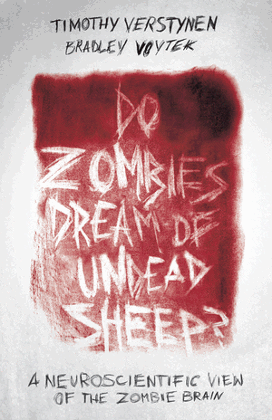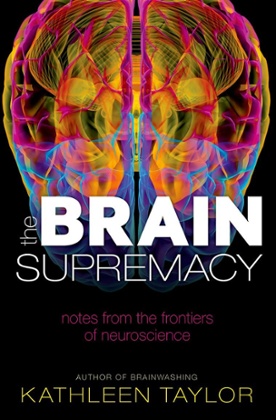
These books arrived recently, either because I purchased them, because a publisher sent them as review copies, or they were gifts from people who know I love books (but who have never seen my groaning bookshelves!).

Do Zombies Dream of Undead Sheep?: A Neuroscientific View of the Zombie Brain by Timothy Verstynen and Bradley Voytek [Princeton University Press, 2014; Guardian bookshop; Amazon UK hardcover; Amazon US hardcover/kindle US]
Publisher’s synopsis: Even if you’ve never seen a zombie movie or television show, you could identify an undead ghoul if you saw one. With their endless wandering, lumbering gait, insatiable hunger, antisocial behavior, and apparently memory-less existence, zombies are the walking nightmares of our deepest fears. What do these characteristic behaviors reveal about the inner workings of the zombie mind? Could we diagnose zombism as a neurological condition by studying their behavior? In Do Zombies Dream of Undead Sheep?, neuroscientists and zombie enthusiasts Timothy Verstynen and Bradley Voytek apply their neuro-know-how to dissect the puzzle of what has happened to the zombie brain to make the undead act differently than their human prey.
Combining tongue-in-cheek analysis with modern neuroscientific principles, Verstynen and Voytek show how zombism can be understood in terms of current knowledge regarding how the brain works. In each chapter, the authors draw on zombie popular culture and identify a characteristic zombie behavior that can be explained using neuroanatomy, neurophysiology, and brain-behavior relationships. Through this exploration they shed light on fundamental neuroscientific questions such as: How does the brain function during sleeping and waking? What neural systems control movement? What is the nature of sensory perception?
Walking an ingenious line between seriousness and satire, Do Zombies Dream of Undead Sheep? leverages the popularity of zombie culture in order to give readers a solid foundation in neuroscience.
My first impression: Just in time for Hallowe’en, this book explores the basic neurobiology of one of the most popular nonexistent creatures known to humans. Although the authors begin with a goofy premise -- zombie dreams -- this topic resonates with their readers, especially those who don’t enjoy science. Illustrative cartoons -- some more whimsical than others -- are sprinkled throughout the book. In addition to each chapter’s source materials & further reading section and the index, the book also includes a glossary that explains some of those scary neuroscience words appearing in the text.

The Brain Supremacy: Notes from the Frontiers of Neuroscience by Kathleen Taylor [Oxford University Press, 2012; Guardian bookshop; Amazon UK paperback; Amazon US paperback/kindle US]
Publisher’s synopsis: In a world full of science, the balance of power between sciences is changing. Advances in physics, chemistry, and other natural sciences have given us extraordinary control over our world. Now the younger sciences of brain and mind are applying the scientific method not only to our environments, but to us. In recent years funding and effort poured into brain research. We are entering the era of the brain supremacy.
What will the new science mean for us, as individuals, consumers, parents and citizens? Should we be excited, or alarmed, by the remarkable promises we read about in the media -- promises of drugs that can boost our brain power, ever more subtle marketing techniques, even machines that can read minds? What is the neuroscience behind these claims, and how do scientists look inside living human brains to get their astonishing results?
The Brain Supremacy is a lucid and rational guide to this exciting new world. Using recent examples from the scientific literature and the media, it explores the science behind the hype, revealing how techniques like fMRI actually work and what claims about using them for mindreading really mean. The implications of this amazingly powerful new research are clearly and entertainingly presented. Looking to the future, the book sets current neuroscience in its social and ethical context, as an increasingly important influence on how all of us live our lives.
My first impression: In this well-written and thought-provoking book, the author explores the poorly-covered tool kits used by modern experimental neuroscience -- how all this specialised equipment works, and how they deliver new information about the brain’s inner workings; equipment such as EEG, MRI, fMRI, MEG, and more. Interestingly, the author also discusses the limits of each technique and in doing so, presents a cogent discussion of the results and sorts of conclusions that can be made. Incidentally, the author quotes my blog colleague, physicist Jon Butterworth, in chapter 2. Originally published as a hardcover in 2012, this book just came out in paperback so if you were waiting for a smaller, less pricey version, it’s here!

Knowledge: A Very Short Introduction by Jennifer Nagel [Oxford University Press, 2014; Guardian bookshop; Amazon UK paperback; Amazon US paperback/kindle US]
Publisher’s synopsis: What is knowledge? How does it differ from mere belief? Do you need to be able to justify a claim in order to count as knowing it? How can we know that the outer world is real and not a dream?
Questions like these are ancient ones, and the branch of philosophy dedicated to answering them - epistemology - has been active for thousands of years. In this thought-provoking Very Short Introduction, Jennifer Nagel considers these classic questions alongside new puzzles arising from recent discoveries about humanity, language, and the mind. Nagel explains the formation of major historical theories of knowledge, and shows how contemporary philosophers have developed new ways of understanding knowledge, using ideas from logic, linguistics, and psychology. Covering topics ranging from relativism and the problem of scepticism to the trustworthiness of internet sources, Nagel examines how progress has been made in understanding knowledge, using everyday examples to explain the key issues and debates
My first impression: Did you know there is a theory of knowledge? I didn’t! In this engaging book, the author discusses a variety of important topics that support this field, including scepticism, rationalism and empiricism, the analysis of knowledge, internalism and externalism, testimony, shifting standards and knowing about knowing. As with nearly all of the books in this series, this one is well-written and includes useful illustrations and cartoons. If I am not mistaken, this is the 400th title published by Oxford in this educational and accessible series of books. I am in love with this series -- it’s like having an extended course of study in one’s rucksack or handbag that’s designed to educate the modern polymath.
.. .. .. .. .. .. .. .. .. .. ..
When she’s not got her nose in a book, GrrlScientist can also be found here: Maniraptora. She’s very active on twitter @GrrlScientist and sometimes lurks on social media: facebook, G+, LinkedIn, and Pinterest.







